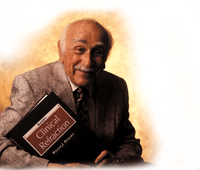I don’t think Dr. Irv Borish actually understood why we all made such a fuss over him and his work. He had so much respect for us—his students and his colleagues—that he truly believed we were all equally learned and sophisticated. He looked at us all as his equals. Dr. Borish’s built-in humility and his honorable notion that we should all be of service to one another, and thus to our patients, was really the reason we should love the man.
Nothing ever got by Dr. Borish. Every now and then I would try to sneak some vague Borish reference into this column. He always knew, sometimes even before the column came out in print.
And, to beat all, Dr. Borish, most likely with a chuckle, always thought it was just dandy when I did mention him. When he would let me know he enjoyed a column, usually via one of our mutual friends like my idol Dr. Jack Runninger, I stammered and blushed like I just got my first kiss. Dr. Borish had whatever “it” is.
But his famous text, ”Clinical Refraction,” just made me mad. I mean “mad” as in “freakin’ crazy.” Now, y’all, I have never been the smartest guy in the room (usually falling somewhere below the guy who dims the lights in a CE meeting) but “Clinical Refraction” should have been named “Today You Will Feel Stupider, Stupid.” I never, ever realized that, “Which is better: number one or number two?” was so impossibly complex until I cracked open Dr. Borish’s book in 1975.
By the way, it’s 2012 and I’m nearly finished reading it.
Don’t Use the “V” Word?
When I was seven years old, my grandmother Mimi told me that if I read the Bible front to back I would automatically go to Heaven someday. I have no reason to doubt what she told me. Likewise, I think that when you finish “Clinical Refraction,” you should automatically be board certified.
Of course, that would mean we’d only have four or five board certified O.D.s and all of them would be living in a mental hospital. “Clinical Refraction” can kill a good man.
Unless…
Unless you, my doctor, take a second to realize what you have in your hands is not something you must ingest all at once. Relax…chill. Hold the book in your hands like you would hold a small, precious child and consider its heft and beauty. Don’t you wonder about the author, such a brilliant man, who dedicated so much to making sure that YOU knew what you should know? “Clinical Refraction” is like a gift from your crazy  aunt—what’s in the package is scary, but you know it will be something irreplaceable that you’ll have to keep forever just in case she comes to dinner and asks you to show it to her.
aunt—what’s in the package is scary, but you know it will be something irreplaceable that you’ll have to keep forever just in case she comes to dinner and asks you to show it to her.
During the initial battles in optometry’s fight to provide medical care, one of my mentors told me to never use the “V” word. Never use the word “vision.” Even as a young doctor, I thought he had lost his mind. To me, eye health and vision are the same thing. Only insurance thinks they are different, mainly because then the insurance company can sell two products instead of one.
Dr. Borish helped create the modern optometrist and we all owe him for that. We are the vision experts. Vision is what we do. Patients are glad we do it. Even now—today—Dr. Borish just wants us to do it right.
God bless, Irv.

